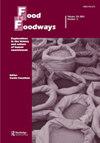残疾歧视及其不满:生活在美国机构的残疾人中,食物是一种权力、控制和抵抗的形式
IF 1.1
Q2 ANTHROPOLOGY
引用次数: 0
摘要
摘要粮食不安全是美国的一个重大问题,对残疾人的影响尤为严重。然而,关于残疾和食物的研究很少,尤其是关于机构中的人的研究,从残疾人的角度来看的研究更少。这篇文章介绍了两个来自不同类型“社区安置”的人种学例子。这些残疾人的第一手资料探讨了不同机构群体家庭环境中粮食不安全的形式,以及如何平衡健康和自由的竞争需求。他们展示了权力、控制和抵抗的概念,以及关于“合适的身体”的基本能力主义假设,是如何在日常生活中发挥作用的。他们强调了居住者自己对这些权力动态的敏锐认识,因此,他们对护理人员的批评是多么谨慎。他们进一步记录了重度残疾人如何能够和不能控制他们在什么时候、哪里以及与谁一起吃饭——这对营养/健康和社会性/包容性都有影响。本文章由计算机程序翻译,如有差异,请以英文原文为准。
Ableism and its discontents: Food as a form of power, control, and resistance among disabled people living in U.S. Institutions
Abstract Food insecurity is a significant problem in the U.S., disproportionately impacting people with disabilities. Yet, little scholarship exists about disability and food, particularly on people in institutions, with even less from disabled people’s perspectives. This article presents two ethnographic examples from different types of “community placements.” These first-hand accounts by disabled people explore the shape that food insecurity takes in different institutional group-home settings, and how one balances the competing needs of health and freedom. They demonstrate how notions of power, control, and resistance, and underlying ableist assumptions about “appropriate bodies,” play out on a day-to-day basis. They highlight an acute awareness by the occupants themselves of these power dynamics and thus, how cautious they were to be critical of their care providers. They further document how severely disabled people can, and cannot, exercise control over what, when, where, and with whom they eat—with implications for both nutrition/health and sociality/inclusion.
求助全文
通过发布文献求助,成功后即可免费获取论文全文。
去求助
来源期刊

Food and Foodways
ANTHROPOLOGY-
CiteScore
2.20
自引率
0.00%
发文量
16
期刊介绍:
Food and Foodways is a refereed, interdisciplinary, and international journal devoted to publishing original scholarly articles on the history and culture of human nourishment. By reflecting on the role food plays in human relations, this unique journal explores the powerful but often subtle ways in which food has shaped, and shapes, our lives socially, economically, politically, mentally, nutritionally, and morally. Because food is a pervasive social phenomenon, it cannot be approached by any one discipline. We encourage articles that engage dialogue, debate, and exchange across disciplines.
 求助内容:
求助内容: 应助结果提醒方式:
应助结果提醒方式:


